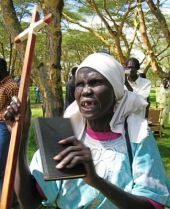Distrust clouds peace euphoria in Sudan rebel town
By Katie Nguyen
RUMBEK, Sudan, Jan 11 (Reuters) – Just days after euphoria greeted the signing of a peace deal to end 21 years of civil war in Sudan, murmurings of mistrust are surfacing in the rebel-held south.

|
|
Sudan Peoples Liberation Movement supporter dances and prays while holding a Cross and bible in Naivasha, Kenya, Friday, Dec. 31, 2004.(AP). . |
Celebratory rallies have been held in the rebel stronghold of Rumbek since Sudan’s Vice-President Ali Osman Mohamed Taha and rebel leader John Garang signed the landmark accord in the Kenyan capital Nairobi on Sunday.
At one rally, former fighters dressed in a ragtag collection of military fatigues assembled in the town’s central Freedom Square, marching to the jubilant whoops and shrieks of women in the crowd.
But many locals are cautious about the deal ending the conflict between the north’s Arabic-speaking Islamist government and the mainly Christian and animist insurgents from the south.
“These Arabs, you can’t do anything with them, you can’t trust them,” said Patrick Deng, a former guerrilla who joined Garang’s Sudan People’s Liberation Army (SPLA) in 1987.
Under the agreement, southerners have the right to vote for secession at the end of the 6-year interim period, a concession granted by the Islamist government in response to the rebels’ core demand for the south’s right to secede.
“It would have been better if the deal split the country,” said the 36-year-old – who now makes a living as a builder in Rumbek – reflecting a desire among many in the town to break with the north as soon as possible.
DEEP MISGIVINGS
The town, a collection of mud huts and one-storey buildings, has remained an SPLA stronghold since it was captured from government forces in 1997.
Its Dinka men and boys, typically marked by lines scarring their foreheads, have long provided the backbone of the SPLA.
Peace promises much to the southerners: an end to war that has led to the deaths of some 2 million people and the long-awaited return of hundreds of thousands of relatives from distant regions and neighbouring countries.
But many hardline SPLA supporters say the northerners are not to be trusted and quote a local saying that reveals the extent of their suspicion and bitterness: “If you are faced with a Muslim and a lion, best to kill the Muslim first because he is more dangerous.”
Sitting on plastic chairs under a tree, a group of youngsters discuss the peace deal and the contents of Garang’s speech, relayed to them by radio.
Youth leader Maluak Muorwel, 24, said Garang’s appeal to make a united Sudan attractive to its citizens was wrong.
“If I was the leader I would make separation attractive – convince the Western world that we are capable of ruling ourselves and having our own country,” said Muorwel, who remembers the town being bombarded by Khartoum’s Antonov planes.
“That is in the mind of everyone – that we need our own country,” he said.
His friend Adam Dut said he was worried the SPLA struggle would be forgotten in the six years before the vote on independence for the south.
“We fear Arabs will use money to buy our vote and create divisions,” said the 21-year-old. “Their interest is not in developing the south but to rule and assimilate us.”
